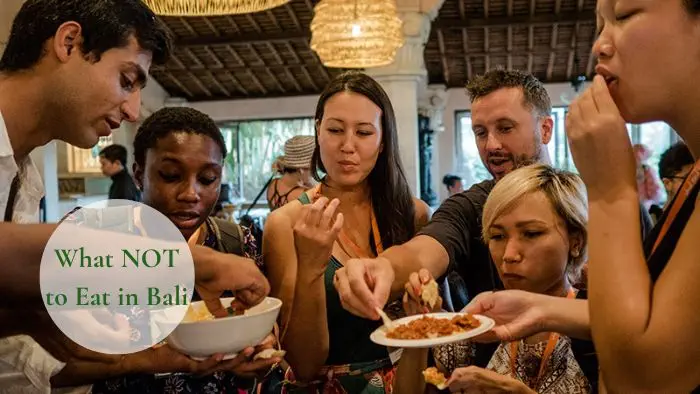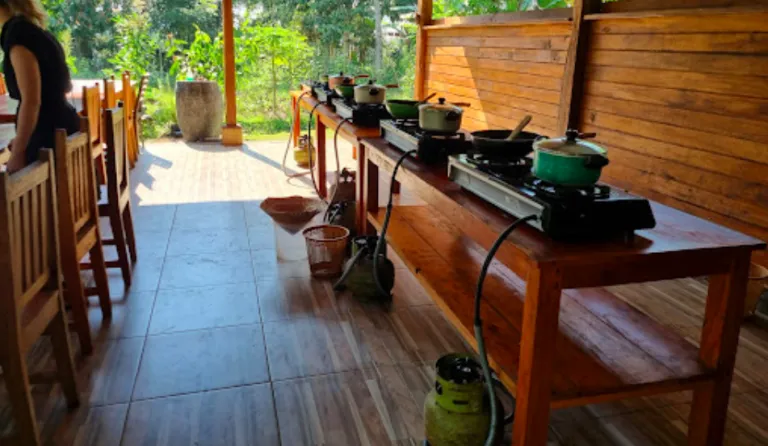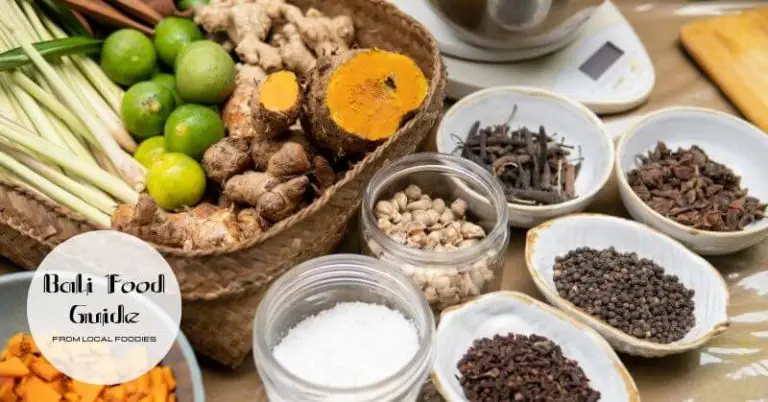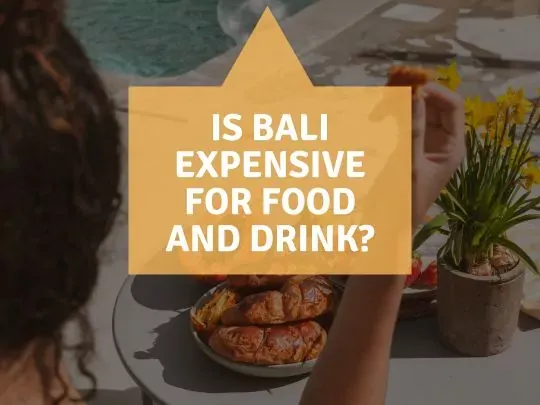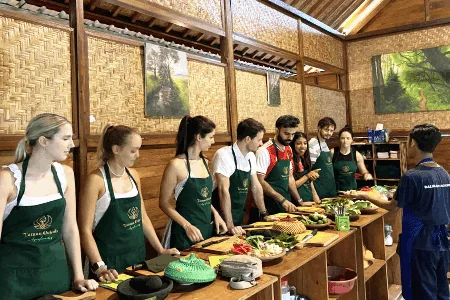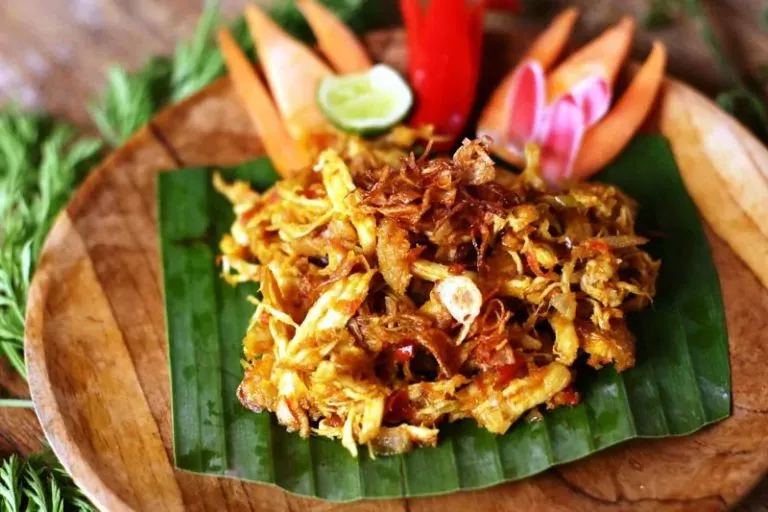If you’re planning a trip to Bali, you’re in for a treat. From fresh seafood to flavorful roasts, the island has a rich and diverse cuisine. But for many travelers, the excitement about food comes with a small worry: “How do I avoid getting sick?”
This guide is here to help. We’ll cover the common food safety pitfalls so you can navigate Bali’s culinary scene with confidence, ensuring your trip is remembered for delicious meals, not for “Bali Belly.”
Food Safety in Bali: 5 Things to Be Cautious Of
With a little knowledge, it’s easy to stay safe. Here are the main things to keep in mind when exploring Bali’s food scene.
1. Tap Water & Ice from Unknown Sources
This is the most important rule. Bali’s tap water is not safe to drink.
- Always drink sealed bottled water.
- Be cautious with ice. In established restaurants and hotels, ice is usually made from filtered water and is safe. If you’re at a smaller, local stall and are unsure, it’s best to order your drink without ice (“tanpa es”).
2. Risky Street Food
While much of Bali’s street food is delicious, it’s wise to be selective.
- Choose busy vendors. A long line of locals is the best sign that the food is fresh, safe, and tasty. High turnover means the food hasn’t been sitting out.
- Watch how it’s cooked. Stick to food that is cooked fresh to order, right in front of you.
3. Food That Has Been Sitting Out
In Bali’s warm and humid climate, bacteria can grow quickly.
- Avoid buffets where food may have been sitting at lukewarm temperatures for a long time.
- Trust your senses. If food that is meant to be hot is only warm, or if anything looks or smells “off,” it’s best to skip it.
4. Unpeeled or Pre-Cut Fruits & Salads
Raw vegetables and pre-cut fruits can sometimes be rinsed in tap water.
- The safest bet is to eat fruits you can peel yourself, like bananas, mangosteens, oranges, and snake fruit.
- Be cautious with raw salads, especially from smaller establishments. Cooked vegetables are always a safer option.
5. Raw or Undercooked Meat
This is a universal food safety rule, but it’s especially important in a tropical climate.
- Ensure your meat is cooked thoroughly. This is especially true for chicken and pork dishes like satay.
- Stick to reputable venues for meat dishes to ensure it has been stored and handled correctly.
The Ultimate Food Safety Secret? Cook It Yourself!
Worried about food safety? The best way to guarantee a delicious and safe Balinese meal is to learn how to make it in a clean, professional kitchen with fresh ingredients from an organic farm. You control everything, and you get an amazing feast.
The Delicious Flip Side: What You SHOULD Eat in Bali
Now for the fun part! Bali is full of incredible food that is both safe and delicious. Here’s what to look for.
- Freshly Grilled & Stir-Fried Dishes: Foods cooked at high temperatures are your best friends. Think grilled chicken satay (Sate Ayam), fried rice (Nasi Goreng), and fried noodles (Mie Goreng) cooked fresh to order.
- Flavorful Indonesian Soups: Hot soups like Soto Ayam (a rich chicken soup) are generally very safe as they are boiled thoroughly.
- Whole Young Coconut: The healthiest and safest drink you can have. The vendor will chop it open right in front of you. It’s refreshing, hydrating, and delicious.
- Meals at Reputable Restaurants: Bali has a world-class dining scene. Restaurants and cafes with good online reviews and a clean appearance are fantastic places to explore the local cuisine without worry.
Go Beyond Just Eating—Become the Chef
You’ve learned what’s safe to eat, now take the next step and learn how it’s made. Our cooking class is the perfect way to dive deep into Balinese culture, connect with local people, and enjoy a feast you can trust completely.
Conclusion: Eat with Confidence
Savoring Bali is all about enjoying its incredible flavors without worry. By being mindful of a few simple rules—sticking to bottled water, choosing freshly cooked food, and eating at busy, reputable places—you can have a safe and delicious culinary adventure.
Frequently Asked Questions
Is it safe to eat at a local ‘warung’?
Absolutely! Warungs (small, family-run eateries) often serve some of the most authentic and delicious food. The key is to choose wisely. Look for warungs that are busy with locals, appear clean, and where you can see the food being cooked fresh.
What is ‘Bali Belly’ and what should I do if I get it?
“Bali Belly” is the common term for traveler’s diarrhea. If you get it, the most important thing is to stay hydrated by drinking lots of bottled water and rehydration salts (available at any local pharmacy or ‘apotek’). Rest and eat plain foods like rice and bananas. If symptoms are severe or persist for more than a couple of days, it’s best to see a doctor.
So, is the ice in Bali always safe?
In most tourist restaurants, cafes, and hotels, the ice is made with filtered water and is perfectly safe. These establishments receive their ice from government-certified tube ice suppliers. If you’re at a very small, remote stall and feel uncertain, simply ask for your drink “tanpa es” (without ice).
Can I brush my teeth with tap water?
It’s generally recommended to use bottled water for brushing your teeth to be extra safe and avoid accidentally swallowing any tap water.

